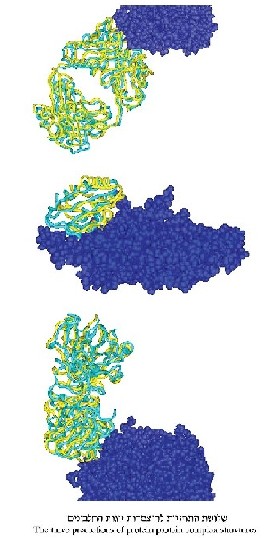עיתונאיות ועיתונאים, הירשמו כאן להודעות לעיתונות שלנו
הירשמו לניוזלטר החודשי שלנו:
Prediction of the structure of protein-protein complexes is an increasingly prominent field of endeavor in the current post-genome era, since new sequences and links between proteins are now regularly being discovered. Docking is a predictive method that uses computer algorithms to create three-dimensional models of the interactions formed between two protein molecules when they make contact, or 'dock,' with one another. The CAPRI Challenge, which requires that all participants predict interactions for the same pairs of molecules, provides a useful basis of comparison of different docking algorithms. The participants are given the structures of individual molecules and are requested to submit their predictions for the resulting complexes by a certain date, after which the experimental structures are made public. An independent group of assessors tests and compares all the predictions.
Predicting the ultimate complex structure of two unbound protein molecules is an exceptionally difficult task, since the proteins change their shapes in response to one another's presence. To tackle the problem, the Weizmann team took rigid, three-dimensional computer models of the unbound molecules and then placed them in different orientations to one another. For each orientation, the molecules were shifted with respect to one another.
The team evaluated each contact between the molecules and gave the contacts a score, based on how well they fit together. Each contact was judged on the basis of geometric fit and, to a lesser degree, electrostatic fit. The team modified their program to allow for small changes that occur when the proteins approach one another -- a delicate task, since excessive modification can destroy the unique surface features of the original molecules.
The CAPRI Challenge provides a service to the scientific community by establishing identical criteria for the comparison of different docking approaches. Independent groups can focus on certain interactions (e.g., geometric or electrostatic) to the exclusion of others and usually represent even those interactions in an approximate form. Also, different groups use different molecular complexes for the development and testing of their prediction methods, and some structures are easier to predict than others. The CAPRI Challenge is a blind test in which the molecules and conditions are equivalent for all participants.
It is a continuous challenge that allows the groups to learn and improve their docking algorithms. Such experiments help the scientific community not only understand the processes by which proteins bind to one another, but also to predict the effects of intervention -- such as drug administration -- on such processes.

Prof. Ephraim Katchalski-Katzir's research is supported by Mrs. Manja Leigh, UK, Sacta-Raschi Foundation and Mr. Avraham Goldwasser, Israel.
Prof. Katchalski-Katzir is the incumbent of the Theodore R. Racoosin Chair of Biophysics.